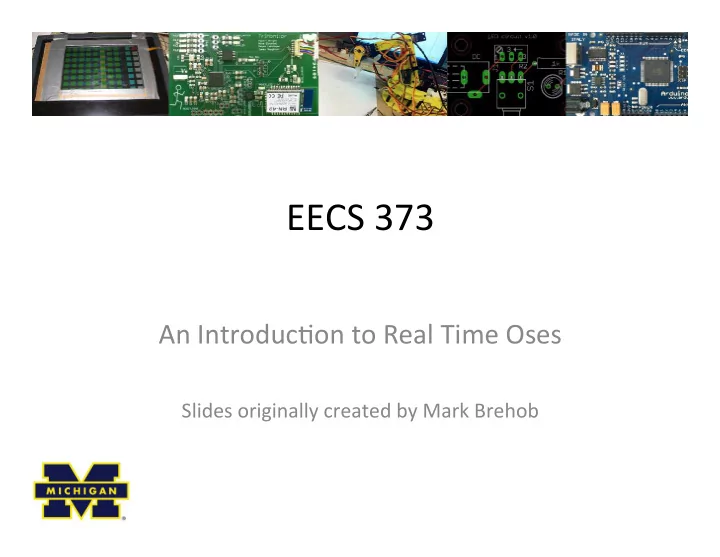

EECS$373$ $ An$Introduc0on$to$Real$Time$Oses$ $ Slides$originally$created$by$Mark$Brehob$
Things$ • Should$be$working$on$your$project$at$this$point$ – Your$group$should$have$something$to$work$on$as$of$ today.$ – Your$group$should$target$having$all$components$be$ “mostly$working”$by$the$second$week$of$April$ • We’re$ending$the$“regular”$lectures$&$labs$ – Focus$on$special$topics$ • Shared$slides,$spreadsheets$ – More$0me$for$project$work$ 2$
What’s$leP$ 3$
Outline$ • Quick$review$of$realR0me$systems$ • Overview$of$RTOSes$ – Goals$of$an$RTOS$ – Features$you$might$want$in$an$RTOS$ • Learning$by$example:$FreeRTOS$ – Introduc0on$ – Tasks$ – Interrupts$ – Internals$(briefly)$ – What’s$missing?$ 4$
Outline$ • Quick$review$of$realR0me$systems$ • Overview$of$RTOSes$ – Goals$of$an$RTOS$ – Features$you$might$want$in$an$RTOS$ • Learning$by$example:$FreeRTOS$ – Introduc0on$ – Tasks$ – Interrupts$ – Internals$(briefly)$ – What’s$missing?$ 5$
RTS$overview$ What$is$a$RealRTime$System?$ • RealR0me$systems$have$been$defined$as:$ "those$systems$in$which$the$correctness$of$ the$system$depends$not$only$on$the$logical$ result$of$the$computa0on,$but$also$on$the$ 0me$at$which$the$results$are$produced";$ – $J.$Stankovic,$"Misconcep0ons$About$RealRTime$ Compu0ng,"$ IEEE#Computer, $21(10),$October$ 1988.$ 6$
RTS$overview$ RealRTime$Characteris0cs$ • Pregy$much$your$typical$embedded$system$ – Sensors$&$actuators$all$controlled$by$a$processor.$ – The$big$difference$is$ !ming&constraints $(deadlines).$ $ • Those$tasks$can$be$broken$into$two$categories 1$ – Periodic&Tasks :$TimeRdriven$and$recurring$at$regular$ intervals.$ • A$car$checking$for$a$wall$every$0.1$seconds;$$ • An$air$monitoring$system$grabbing$an$air$sample$every$10$seconds.$$ – Aperiodic :$eventRdriven$ • That$car$having$to$react$to$a$wall$it$found$ • The$loss$of$network$connec0vity.$$ 1 Sporadic$tasks$are$some0mes$also$discussed$as$a$third$category.$$They$are$tasks$similar$to$aperiodic$tasks$but$ac0vated$with$some$$ 7$ $$known$bounded$rate.$$$The$bounded$rate$is$characterized$by$a$minimum$interval$of$0me$between$two$successive$ac0va0ons. $
RTS$overview$ Some$Defini0ons$ • Timing&constraint:& constraint$imposed$on$0ming$ behavior$of$a$job:$hard,$firm,$or$soP.$ & • Release&Time :$Instant$of$0me$job$becomes$ available$for$execu0on.$$$ • Deadline :$Instant$of$0me$a$job's$execu0on$is$ required$to$be$completed.$$If$deadline$is$infinity,$ then$job$has$no$deadline.$$ • Response&!me :$Length$of$0me$from$release$0me$ to$instant$job$completes.$$ 8$
RTS$overview$ SoP,$Firm$and$Hard$deadlines$ • The$instant$at$which$a$result$is$needed$is$called$a$ deadline.$$ – If$the$result$has$u0lity$even$aPer$the$deadline$has$ passed,$the$deadline$is$classified$as$ so8 ,$otherwise$it$ is$ firm .$$ – If$a$catastrophe$ could $result$if$a$firm$deadline$is$ missed,$the$deadline$is$ hard .$ • Examples?$ 9$ Defini0ons$taken$from$a$paper$by$Kanaka$Juvva,$not$sure$who$originated$them.$
RTS$overview:$Scheduling$algorithms$ Scheduling$algorithms$ • A$scheduling$algorithm$is$a$scheme$that$ selects$what$job$to$run$next.$ – Can$be$preemp0ve$or$nonRpreemp0ve.$ – Dynamic$or$sta0c$priori0es$ – Etc.$ In&general,&a&RTS&will&use&some&scheduling&algorithm&to&meet& $ its&deadlines.& 10$
RTS$overview:$Scheduling$algorithms$ Two$common$scheduling$schemes$ • Rate&monotonic&& • Earliest&deadline&first& (RM)& (EDF)& – Sta0c$priority$scheme$ – Dynamic$priority$scheme$ – Preemp0on$required$ – Preemp0on$required$ – Simple$to$implement$ – Harder$to$implement$ – Nice$proper0es$ – Very$nice$proper0es$ We&aren’t&going&to&worry&about&the&details&of&either.&&The&point& is&that&we&some!mes&want&sta!c&priori!es&(each&task&has&a&fixed& priority)&and&some!mes&we&want&dynamic&priori!es&(priori!es&& change&for&a&task&over&!me).& 11$
RTS$overview:$Scheduling$algorithms$ But$tasks$don’t$operate$in$a$vacuum$ • It$is$generally$the$case$that$different$tasks$might$ need$shared$resources$ – For$example,$mul0ple$tasks$might$wish$to$use$a$UART$ to$print$messages$ • You’ve$seen$this$in$the$lab.$ • How$can$we$share$resources?$ – Could$have$task$using$resource$disable$interrupts$ while$using$resource.$ • But$that$would$mess$with$interrupts$that$don’t$(or$won’t)$ use$the$resource.$ – Could$disable$those$that$could$use$the$resource$ • But$would$mess$with$interrupts$that$won’t$use$it$this$0me.$ 12$
RTS$overview:$Scheduling$algorithms$ Sharing$resources$ • Need$some$kind$of$a$lock$on$a$resource.$ – If$a$high$priority$task$finds$a$resource$is$locked,$it$ goes$to$sleep$un0l$the$resource$is$available.$ – Task$is$woken$up$when$resource$is$freed$by$lower$ priority$task.$ – Sounds$reasonable,$but$leads$to$problems.$ • More$formally$stated$on$next$slide.$ 13$
RTS$overview:$Scheduling$algorithms$ Priority$Inversion$ • In$a$preemp0ve$priority$based$realR0me$system,$some0mes$ tasks$may$need$to$access$resources$that$cannot$be$shared.$$ – The$method$of$ensuring$exclusive$access$is$to$guard$the$cri0cal$ sec0ons$with$binary$semaphores.$$ – When$a$task$seeks$to$enter$a$cri0cal$sec0on,$it$checks$if$the$ corresponding$semaphore$is$locked.$$ – If$it$is$not,$the$task$locks$the$semaphore$and$enters$the$cri0cal$sec0on.$$ – When$a$task$exits$the$cri0cal$sec0on,$it$unlocks$the$corresponding$ semaphore.$ • This$could$cause$a$high$priority$task$to$be$wai0ng$on$a$lower$ priority$one.$ – Even$worse,$a$medium$priority$task$might$be$running$and$cause$the$ high$priority$task$to$not$meet$its$deadline!$ Mohammadi,$Arezou,$and$Selim$G.$Akl.$"Scheduling$Algorithms$for$RealRTime$Systems."$(2005)$ 14$
RTS$overview:$Scheduling$algorithms$ Example :$Priority$inversion$ • Low$priority$task$“C”$locks$resource$“Z”.$ • High$priority$task$“A”$preempts$“C”$then$ requests$resource$“Z”$ – Deadlock,$but$solvable$by$having$“A”$sleep$un0l$ resource$is$unlocked.$ • But$if$medium$priority$“B”$were$to$run,$it$ would$preempt$C,$thus$effec0vely$making$C$ and$A$run$with$a$lower$priority$than$B.$ – Thus$priority$ inversion .$ 15$
RTS$overview:$Scheduling$algorithms$ Solving$Priority$inversion$ • Priority$Inheritance$ – When$a$high$priority$task$sleeps$because$it$is$ wai0ng$on$a$lower$priority$task,$have$it$boost$the$ priority$of$the$blocking$task$to$its$own$priority.$$ 16$
Outline$ • Quick$review$of$realR0me$systems$ • Overview$of$RTOSes$ – Goals$of$an$RTOS$ – Features$you$might$want$in$an$RTOS$ • Learning$by$example:$FreeRTOS$ – Introduc0on$ – Tasks$ – Interrupts$ – Internals$(briefly)$ – What’s$missing?$ 17$
RTOS$overview$ Goals$of$an$RTOS?$ • Well,$to$manage$to$meet$RT$deadlines$(duh).$ – While$that’s$all$we$ need $we’d$ like $a$lot$more.$ • APer$all,$we$can$meet$RT$deadlines$fairly$well$on$the$bare$ metal$(no$OS)$ – But$doing$this$is$0me$consuming$and$difficult$to$get$right$as$the$ system$gets$large.$ • We’d$ like $something$that$supports$us$ – Deadlines$met$ – Interrupts$just$work$ – Tasks$stay$out$of$each$others$way$ – Device$drivers$already$wrigen$(and$tested!)$for$us$ – Portable—runs$on$a$huge$variety$of$systems$ – Oh,$and$nearly$no$overhead$so$we$can$use$a$small$device!$ » That$is$a$small$memory$and$CPU$footprint.$ 18$
RTOS$overview$ Detailed$features$we’d$like$ Deadlines&met& Interrupts&just&work& • Ability$to$specify$scheduling$ • Don’t$need$to$worry$about$ algorithm$ saving/restoring$registers$ – We’d$like$priority$inversion$ – Which$C$just$generally$does$ dealt$with$ for$us$anyways.$ • Interrupts$are$fast$ • Interrupt$priori0za0on$easy$ to$set.$ – So$tasks$with$0ght$deadlines$ get$service$as$fast$as$possible$ • Basically—rarely$disable$ interrupts$and$when$doing$ so$only$for$a$short$0me.$ • 19$
RTOS$overview$ Detailed$features$we’d$like:$ Tasks&stay&out&of&each&others&way $ • This$is$actually$remarkably$ • The$standard$way$to$do$this$is$ hard$ with$page$protec0on.$ – Clearly$we$need$to$worry$about$ – If$a$process$tries$to$access$ CPU$u0liza0on$issues$ memory$that$isn’t$its$own,$it$ fails.$ • That$is$what$our$scheduling$ algorithm$discussion$was$to$ • Probably$a$fault.$ address$ • This$also$makes$debugging$a$LOT$ – But$we$also$need$to$worry$ easier.$ about$ memory $problems.$ • This$generally$requires$a$lot$of$ • One$task$running$awry$shouldn’t$ overhead.$ take$the$rest$of$the$system$ – Need$some$sense$of$process$ down.$ number/switching$$ – So$we$want$to$prevent$tasks$ from$harming$each$other$$ – Need$some$kind$of$MMU$in$ hardware$ • This$can$be$ key .$$If$we$want$ mission$cri0cal$systems$sharing$ • Most$microcontrollers$lack$this…$ the$CPU$with$less$important$ • So$we$hit$some$kind$of$minimum$ things$we$have$to$do$this.$ size. & • Alterna0ve$it$to$have$separate$ processors.$ – $$$$$ 20$ Further$reading$on$page$protec0on$(short)$hgp://homepage.cs.uiowa.edu/~jones/security/notes/06.shtml$$
Recommend
More recommend